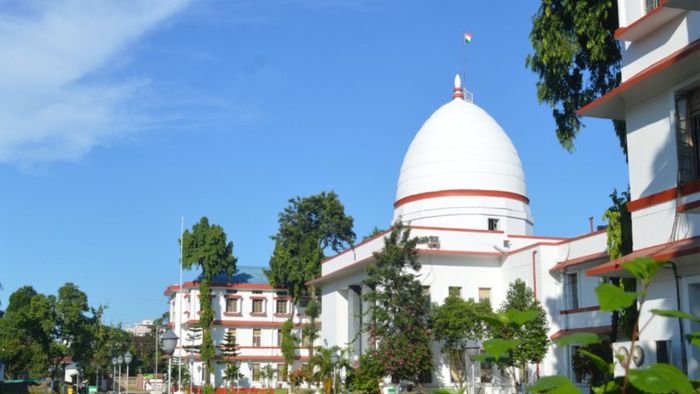Gauhati High Court orders inquiry into missing drugs seized in 2022 Karbi Anglong case
The Gauhati High Court has directed Assam’s Director General of Police (DGP) to conduct an inquiry into the whereabouts of over 1,995 grams of suspected heroin seized during a drug bust in Karbi Anglong in May 2022.

- Sep 26, 2024,
- Updated Sep 26, 2024, 11:40 AM IST
The Gauhati High Court has directed Assam’s Director General of Police (DGP) to conduct an inquiry into the whereabouts of over 1,995 grams of suspected heroin seized during a drug bust in Karbi Anglong in May 2022.
This order follows the revelation that the investigation officer (IO) was unaware of the seized contraband’s location, a significant breach that led the court to quash the conviction of two accused individuals.
In a case that has raised serious questions about procedural lapses in a high-profile drug haul, the Gauhati High Court has instructed Assam's Director General of Police (DGP) to investigate the status of a substantial quantity of heroin seized in Karbi Anglong in May 2022. The incident came to light after the investigating officer admitted to not knowing the current location of the seized contraband, leading to concerns over the handling of crucial evidence.
The case dates back to May 8, 2022, when law enforcement officers at Dillai in Karbi Anglong intercepted a vehicle and confiscated 1,995.29 grams of suspected heroin contained in 152 boxes. Two individuals were arrested during the operation. The local court in Karbi Anglong later convicted the duo in July 2023, sentencing them to ten years of imprisonment.
Also Read: Assam: School authorities including principal transferred after student's death in Sipajhar
However, the case took a turn when the judgment was challenged in the Gauhati High Court. After hearing submissions from both the defense and prosecution, the High Court, under a single bench led by Justice AD Choudhury, found significant violations of the Narcotic Drugs and Psychotropic Substances (NDPS) Act during the trial, which led to the quashing of the lower court’s ruling.
A critical factor in the High Court’s decision was the apparent mishandling of the seized drugs. The investigation officer’s testimony revealed that he was unaware of the contraband’s location and could not provide evidence showing that it had been properly stored or destroyed. "A very disturbing fact emerges from the evidence of the IO that he is not aware of the whereabouts of the drugs seized. Neither it was exhibited in the trial nor could anything be brought on record as regards the destruction of such a huge quantity of the alleged contraband,” stated the court’s ruling. The absence of the drugs during the trial proceedings raised serious doubts about the credibility of the investigation and the prosecution’s ability to follow legal protocols under the NDPS Act.
The NDPS Act outlines strict procedures for the search, seizure, and disposal of narcotics. The relevant sections, particularly Section 42 (which deals with search and seizure procedures) and Section 52A (which mandates the proper disposal of narcotics and ensures that necessary evidence is admissible in court), were found to have been violated. This non-compliance was pivotal in the High Court’s decision to overturn the convictions.
The court noted that the investigation officer had claimed the drugs were sent to the court. However, no documentation or evidence was provided to corroborate this claim. Further, there was no record of the contraband being held in the court’s custody or any indication that it had been disposed of as per legal requirements.
A magistrate had previously instructed the Officer-in-Charge of the Dillai police station to file a petition for the disposal of the narcotics with the District Drug Disposal Committee within 30 days of receiving the chemical analysis report from the Forensic Science Laboratory. The Committee was then responsible for deciding on the matter, but the High Court found no records indicating that these directives were followed.
"The trial court records or the records of the Magistrate also do not disclose anything as regards the availability of same under court's custody nor there is any material showing the disposal of the substance," the court stated. "Thus, the seized contraband is neither available in the Malkhana of the police station nor the court nor anything on record available as regards any direction issued by the District Drug Disposal Committee for disposal of the seized narcotic."
The lapse in the handling of the evidence and lack of documentation led the High Court to cast doubt on whether the narcotics were ever properly sealed after their seizure. "There were serious doubts as regards the time and place of sealing the alleged contraband and whether it was sealed at the spot in the presence of the independent witness and sealed at any other place that too in the presence of witnesses," the court observed.
In addition to ordering the DGP’s inquiry, the High Court has directed the Registrar (Vigilance) to obtain reports from both the District and Sessions Judge of Karbi Anglong and the District Drug Disposal Committee concerning the disposal process of the narcotics seized in the case. These reports are expected to provide further clarity on whether procedural failures occurred at various stages of the investigation and trial.
The Gauhati High Court’s directive to the DGP is seen as a critical step towards uncovering the truth behind the missing drugs. If found guilty of negligence, law enforcement and judicial officers may face serious repercussions, and the case could set a precedent for how future narcotics cases are handled in Assam. For now, the state awaits the results of the inquiry, which will likely have far-reaching implications for drug enforcement in the region.